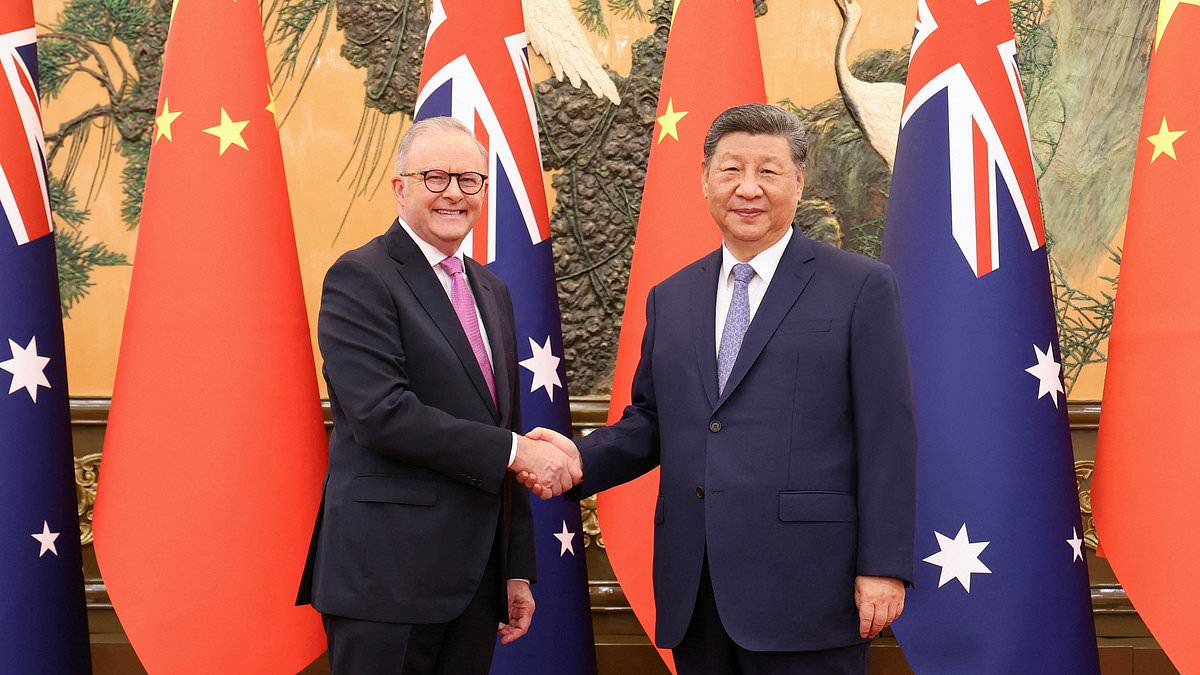Anthony Albanese had an observation for viewers back home as he concluded a successful six-day tour of China.
‘China isn’t just Beijing or Shanghai, any more than is Sydney or Melbourne,’ he told reporters.
As the prime minister flies out on Friday, he does so from a regional city many ns have never heard of.
Chengdu, the capital of Sichuan province and the gateway to China’s west, is nonetheless home to 21 million people and a burgeoning hub of high-tech medical research, finance, fashion and culture.
Like the rest of China, Chengdu has been transformed beyond recognition since Mr Albanese’s first visit to the country in the 1990s, as Deng Xiaoping’s economic liberalisation tapped its potential to become a global superpower.
That transformation has not been lost on the prime minister, who in his second official leaders’ visit to China, summed it up as a nation that ‘sees itself as confident going forward’.
‘I’m an urban policy nerd,’ he said.
‘As you drove from the tennis centre to here yesterday afternoon, it struck me that there was more innovative architecture than in any city I have been to around the world.’
Even from a vantage point atop Mr Albanese’s high-rise hotel in central Chengdu, it’s impossible to see an end to the skyscrapers stretching far off into the distance.
China is a country that knows how to build.
In less than three decades, it has built more kilometres of high-speed rail than exists in the rest of the world.
Naturally, China has an approach to development and community consultation that simply would not fly in the low-rise inner suburbs of Sydney or Melbourne.
Flying over the outskirts of major Chinese cities, farmland is seen directly abutting grids of high-rise apartment blocks.
But what it demonstrates is the sheer unfettered capacity of the Chinese economy, something members of Mr Albanese’s front bench – converted to the supply-side progressive agenda – would like to capture to solve ‘s own housing and energy challenges.
And there is still so much latent potential in the nation of 1.4 billion citizens.
Economic growth has slowed and there are concerns that, with its ageing population and a looming middle-income trap, China may soon reach its peak.
But it’s still on track to reach its GDP target of five per cent growth this year.
That would mean about another $1.4 trillion added to its economy – the equivalent of adding half of to the Chinese economy in just one year.
The prime minister’s itinerary has included retracing the steps of Gough Whitlam on the Great Wall of China, attending a tennis tournament and visiting a panda research centre in the southwestern city of Chengdu.
Back home, the optics of visiting popular tourist sites attracted sniping from the Opposition.
Coalition frontbencher James Paterson suggested the prime minister was enjoying himself too much.
‘I do wonder whether a Gough Whitlam history tour on the Great Wall of China, whether a visit to Chengdu to pose with some pandas, and whether a hit of tennis is strictly necessary as part of a six-day visit to China, when there is so much else at stake in our other international relationships around the world,’ he told Sky News on Thursday.
‘And frankly, I have to say that some of this is starting to look a little bit indulgent.’
Mr Albanese has himself been eager to draw links between his tour and those of former Labor prime ministers Whitlam and Bob Hawke, who also visited the giant pandas in 1986.
What those and his visits achieved was building respect between and China, which would in turn result in better economic and diplomatic outcomes, the PM said.
‘Those pictures go to 27 million people, potentially, in . They go to over a billion people in China,’ Mr Albanese told reporters in Chengdu.
‘And those billion people represent people who are increasingly rising up the income ladder and are potential tourists and therefore job creators in .
‘If James Patterson doesn’t understand that, then he doesn’t understand much.
‘The Great Wall of China symbolises the extraordinary history and culture here in China, and showing a bit of respect to people never cost anything. You know what it does, it gives you a reward.’
Mr Albanese’s trip has been shorter on concrete outcomes than in previous years, when his resumption of dialogue with China saw $20 billion worth of Chinese trade sanctions lifted from n exports.
But the welcome has been warmer and coverage from Chinese state media more effusive than at any time since before the breakdown in Sino-n relations in 2020.
A few agreements to boost trade and tourism links have been reached.
But the increased dialogue and co-operation in areas from green steel to medical technology were part of a gradual improvement in relations that would advance ‘s national interests, Mr Albanese said.
‘You don’t go from a position of where we were into absolute agreement on everything. That’s not the goal.’
Despite the improving mood, China and still have many issues they disagree on.
In meetings with Chinese President Xi Jinping and Premier Li Qiang, Mr Albanese raised concerns over China not providing advance notice of naval live-fire drills off that forced commercial flights to divert.
Meanwhile, Mr Li has voiced his dismay over ‘s stringent restrictions on foreign investment from China, imploring the n government not to treat Chinese firms unfairly.
‘We have different political systems, but it has been constructive and has been an important step in the developing of our relationship,’ Mr Albanese said.
